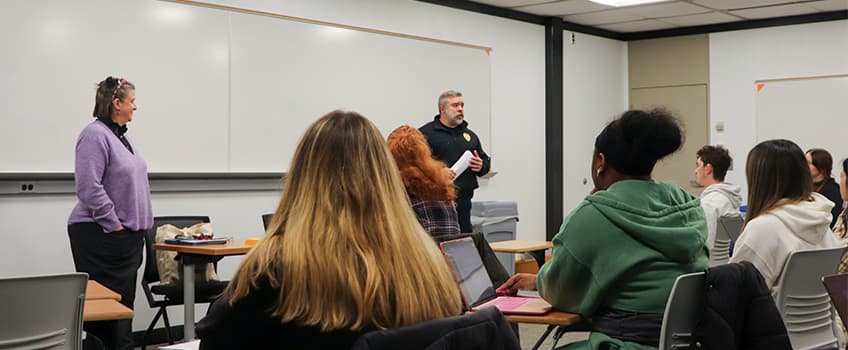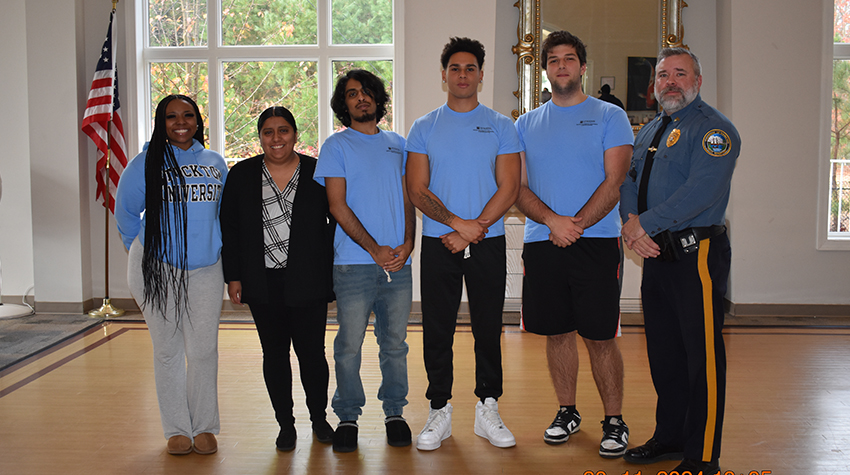Students Partner with Police to Analyze Community Interactions

Criminal Justice Professor Jess Bonnan-White and Sgt. Craig Clayton '04 of the Township of Hamilton Police Department partnered up to create a cyclical project that analyzes policing interactions.
Galloway, N.J. — A unique partnership between the Hamilton Township Police Department and a Stockton University professor has given Criminal Justice students the opportunity to spark conversations on the effectiveness of local policing.
Over the past year, Hamilton Sgt. Craig Clayton, a 2004 Stockton alum, has worked with Criminal Justice Professor Jess Bonnan-White to develop a quantitative study on the interactions between community members and local law enforcement. The results will be utilized to form policy briefs and suggestions for the police department.
“I mean, frankly, the best part about it is that nobody else is doing this,” Clayton said. “I don't like being behind the 8-ball when it comes to how policing is done, and I think this puts the Township of Hamilton kind of ahead of the curve with that regard. I think most agencies would certainly benefit from a partnership with the university. We're just kind of one of the first to knock on that door.”
Through the project, both Bonnan-White and Clayton hope to expose Criminal Justice students to real-world implications that are difficult to explore in theory courses, and strengthen the relationships between Stockton, the local community and law enforcement.
“I take my hat off to the department for being willing to kind of put themselves out there like this because a lot of departments don’t. They don’t reach out to academics and say, ‘Is there a way that we can partner?’” said Bonnan-White. “We're not often seen as the kinds of institutions they want to interact with when, in fact, we're often asking the same questions, so why not put our heads together?”
Clayton originally came up with the idea when he took a graduate course at Fairleigh Dickinson University in which he was tasked with creating a sample five-year plan for his police department.
In his plan, he identified that the department lacked a way to quantitatively measure the satisfaction of an important stakeholder group: the community they serve. While ambitious, Clayton lacked the resources to create a sustainable way to collect the data necessary to accurately measure the public’s response and reactions to policing, and the project was put on the back burner.
That’s where Bonnan-White stepped in. The two met during a session that Clayton gave during the NJ State Association of Chiefs of Police Command and Leadership Academy in 2024. Bonnan-White frequently audits the class as part of her research through the School of Social and Behavioral Sciences' Community-Based Social Research Collaborative. She told Clayton that a community survey was a great idea.
Asking the Right Questions: Crafting and Circulating the Survey
Hamilton Township residents were asked to rate their satisfaction with their experiences interacting with law enforcement. This included their ease of accessing dispatch by calling 911, their level of satisfaction following an encounter with police and what they personally believe to be issues that should be prioritized within the department (e.g., speeding and traffic violations).
Students in Bonnan-White's undergraduate service-learning course met with community members through various town and city hall meetings and collected 450 responses. Although she and the students were hopeful for a larger pool of data to work with, Bonnan White felt eager about the response the project has received so far.
“We tried to show residents that this project isn’t just the police but comes from undergrads who are trying to learn how to be police officers, victim advocates, prosecutors and lawyers who want to hear what they all think,” Bonnan-White said. “The feedback we received in those community meetings was that they really enjoyed seeing Stockton students not just sitting on campus – they’re out doing all of these high-impact practices, and they valued seeing service-learning in this way.”
Clayton expressed similar sentiments, saying the community members “lit up” upon seeing students at one of their scheduled coffee and doughnuts social hours. He added that the students also seemed to benefit from the community interaction.

“I'm used to standing up and talking in front of those groups, but for them to be there and to see another avenue of law enforcement that you don't see every day was great,” Clayton said.
Criminal Justice major Stephanie Gonzalez admitted that the experience of interacting with the community at first left her conflicted because she felt that her role as a student limited the help she could provide them.
However, she soon became more resolute in both wanting to spread the word about the survey she and her classmates helped create and her future aspirations of becoming a police officer who is a pillar of support for her community.
“With this survey, it could help solve the issues that the community is having,” Gonzalez said. “If the police departments do not know about the issue, how could they fix it? With the survey, it is a step closer to better and safer communities.
“This project made me want to become a police officer more and go out there and be involved with the community,” continued the Vineland resident. “I feel like many communities believe there is this barrier between them and law enforcement, and they should not have that feeling. With more law enforcement out in the community doing these kinds of projects, it brings the communities and law enforcement together.”
Graduate Data Analysis and Next Steps
After collecting the responses, the analysis and research projects can begin in Bonnan-White’s graduate course, “Criminological Theory.” Utilizing the data, the graduate students will form policy suggestions that will be presented to the Township of Hamilton Police Department and the local community.
The project is designed to be cyclical. Undergraduate students in Bonnan-White’s upcoming fall course will have the opportunity to repeat the process of creating and disseminating surveys that her next group of graduate students will analyze and form recommendations from. Clayton will assist in both spreading the word about the survey and presenting the students’ findings in various community meetings.
“The beauty of it is that, when we do 2026's survey, we will know if we improved in any areas, and if we didn't, we would know that we have to work a little bit harder. Then, as the years go on, we really can see what policing methods work, which in reality, there aren’t a whole lot of measures for that,” Clayton said. “That's what I'm most excited about — first, getting the numbers (of participants) up, and then utilizing those numbers.”
Bonnan-White said she hopes the data will help her and police departments manage the public’s expectations and benefit community policing.
“Police departments everywhere are understaffed and under-resourced, so some of what can be done and what they want to do are often two very different things. So, working with the public to work on solutions together is the ideal of what community policing is,” Bonnan-White said.
– Story by Loukaia Taylor
– Photos by Loukaia Taylor and submitted
Changes Made to Criminal Justice Degree Program
February 10, 2025
Galloway, N.J. — Stockton University has changed some of the requirements of its undergraduate Criminal Justice degree program to meet the evolving needs of the field.
Effective for incoming students in fall 2025, Stockton will offer a Bachelor of Science in Criminal Justice. Current students will earn a Bachelor of Arts in the major.
Marissa Levy, the dean of the School of Social and Behavioral Sciences, said one of the main reasons for the switch is to better prepare students for jobs in the Criminal Justice field.
“The expanded curriculum that the B.S. degree offers allows Stockton’s program to not only remain competitive with other programs in the region, but it also provides the curricular latitude for students to graduate with skills and knowledge valued by employers and the communities they serve,” she said.


